An arrow on the ground composed of rocks points the way to Santiago
What signs? How do you read the signs? Nature and all things in it are our constant and consistent companions on the camino.
Too, my stick is by my side although I had some close calls. You see, a number of albergues do not allow walking sticks or shoes in the rooms. They must be left at the front door or outside and picked up when leaving. In the rush to put on my shoes, leave and the dread of walking another 20 or 30 kilometers, it is easy to miss my stick until a step outside feels unfamiliar.
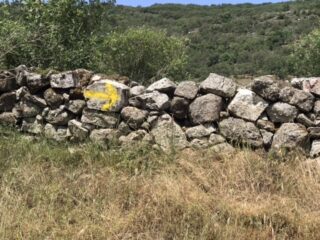
I never walk very far before I remember that my stick is still resting in the albergue! Going back a few feet to retrieve it has been a source of amusement for my fellow peregrinos!
A sign is more than a sign
If you pay attention, signs on the camino tell stories. Cubes set on the path indicate that you are actually following ancient Roman paths or roads. Or you may be near an old path that detours from the camino trail to religious and historical points of interest. These off routes will eventually lead back to the camino path but they increase the distance walked.
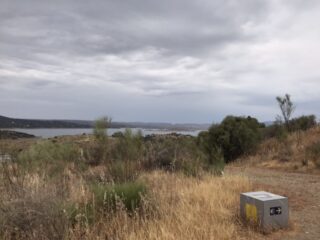
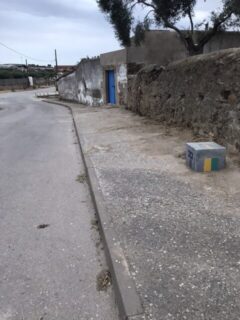
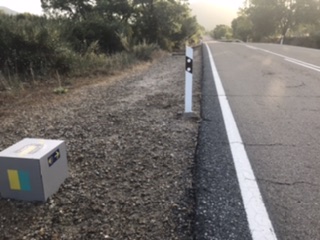
Meditation of the signs
Nature is a perfect backdrop for walking meditation. One step, then another, and another. It seems to be monotonous. One tree after the other or cloud or sunrise or sunset. Are they monotonous or wondrous things to behold?
Sunrise is an event that can be witnessed each and every morning if we wish. It is a moment that we all try to capture in our memories at least once on the camino.
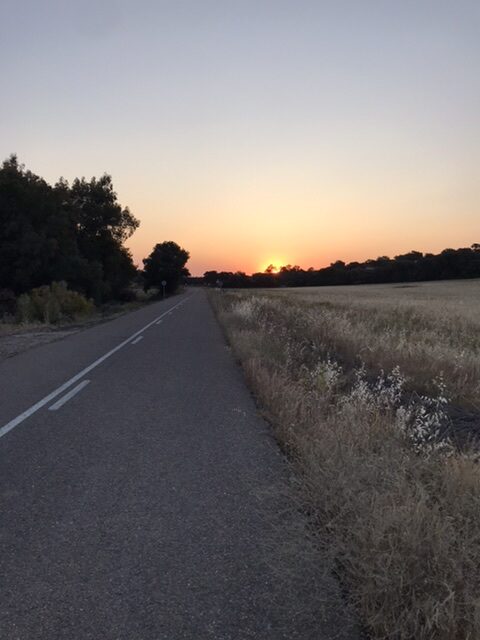
The Way with signs
Steps take me to the next town where I get another opportunity to rest my feet and my mind.
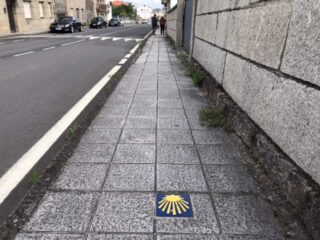
Yes, my mind experiences a certain stress to catch a glimpse of a sign or marker that directs me out of the “mess” that I keep questioning. That mess? It’s wondering why I put myself into this uncomfortable olympian-sized event called a pilgrimage to look for little yellow arrows!
The journey requires that I believe that I will get there. There, being Santiago de Compostela, is a long way down the camino path. Right now, there is the town, village, or city I seek for a night’s rest and succor. As the night skies blanket this place of rest, my road weary body relaxes. I close my eyes and fall asleep.
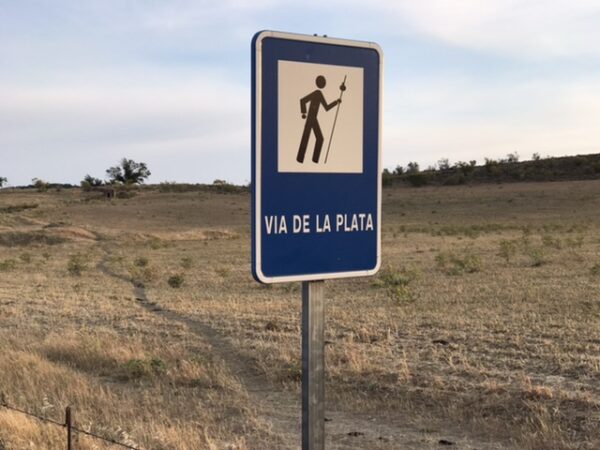
As I enter a town, I look for yellow or blue arrows that direct me to an albergue. If there is more than one albergue, signs point here and there. It seems like a friendly competition to lure entice tired pilgrims to go there not here.
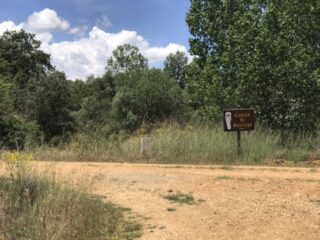
From that point the “race” is on. A donativo or municipal albergue fills up quickly, leaving slightly more expensive hostels or hotels as the only recourse, besides camping, for shelter.
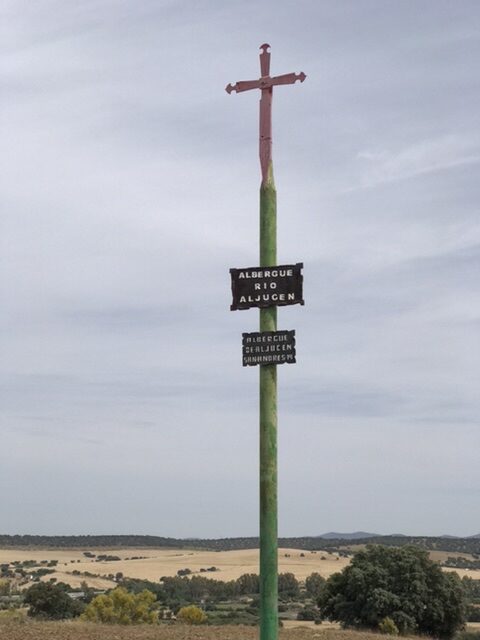
Picking up the trail
In the morning, there are arrows to get out of town and back to the camino trail… usually. For the life of me, I miss most of them. My heart races at the thought of being the last pilgrim leaving the albergue, having no clue where to resume the trail. Usually the trek continues in the direction of travel before reaching the albergue door. However, if you wandered around the town looking for the place – like me – that advice might not be valid.
Sometimes an arrow is painted on a curb or on the street or wall near the albergue. If confusion reigns, I may have to ask a passing stranger to direct me to the trail out of town. I have done it many times!
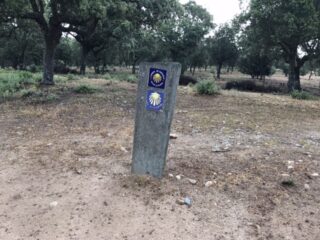
Sign of the times
For over one thousand years, pilgrims walked the camino on trails not as well-marked as they are today. They did not have signs as we know them. Word of mouth from villagers, peddlers, farmers, journeymen, clergy, and others helped people along. The path was dangerous. I imagine that some pilgrims never even made it to Santiago.
Modern pilgrims utilize smartphones loaded with maps, guidebooks, GPS, and other high tech location apps to get them to each town. I am very low tech and began my pilgrimage believing that reading signs, looking for yellow arrows and making a list of suggested stages or travel distances would be enough to get me to each day’s destination. It works much of the time.
At the start of my pilgrimage and, even now, I missed signs and markings. However, there have been times when a fellow pilgrim or townsfolk used an app to help me reach my destination. Amusingly, they were more than happy or annoyed to admonish me to look into downloading one or two myself.
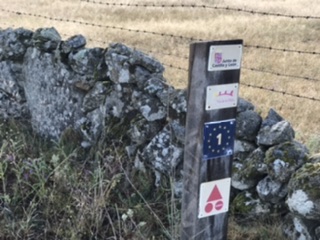
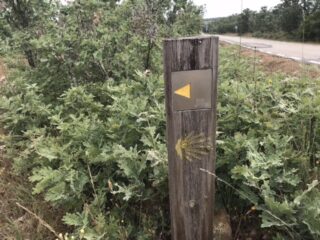
Often markers are topped with small stones, pebbles, even discarded shoes as a sign of gratitude for reaching a personal camino milestone (yes, pun intended).
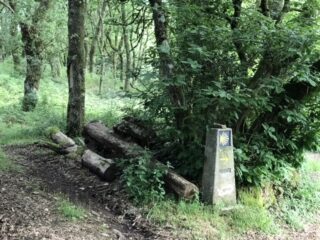
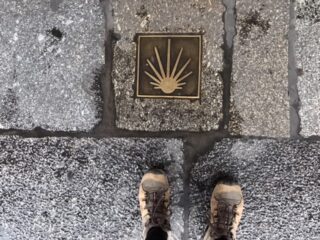
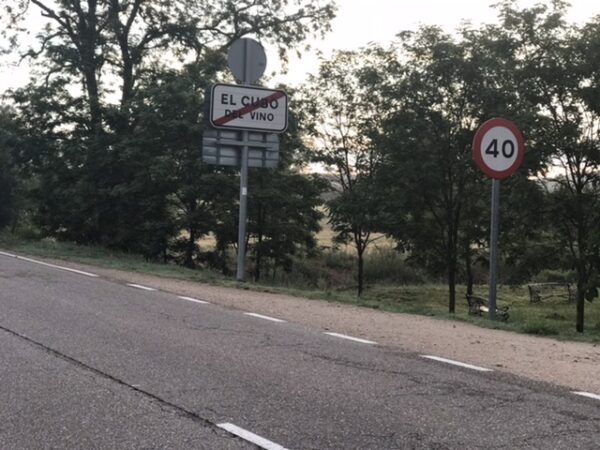
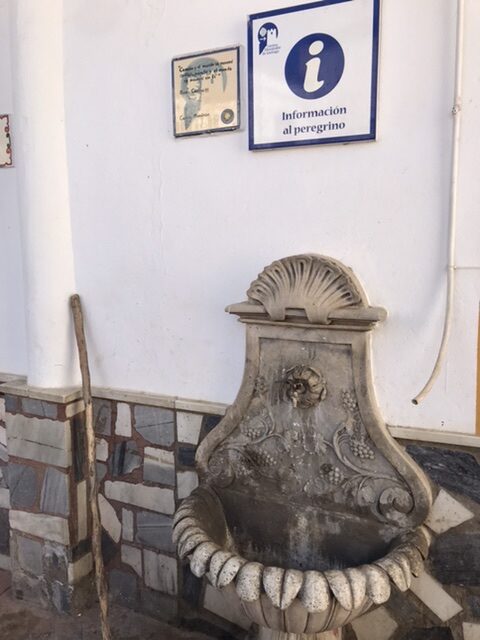
A memorable encounter
I met a nice local couple walking their dog at the outskirts of Almeria. We began talking about my pilgrimage here in Spain. They were very interested in me and asked many good questions. I asked questions, too, including whether either of them walked the camino. The woman had walked, not the Mozárabe, but the camino Francés. I think that prompted them to offer to walk with me for a while on the path. That made me happy but I did not want to impose on their time.
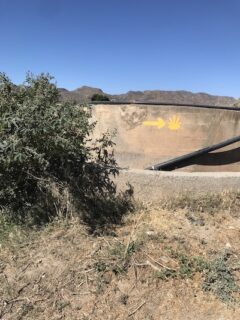
“No imposition”, they assured me. So we walked on and talked.
We talked a little about their lives and mine. They were caring and personable. They wanted to make sure that I cleared a slightly tricky part of the path that I was walking. Together, we walked more than a kilometer before they turned back. I continued on my way with a sweet, lasting memory of the start of my camino.
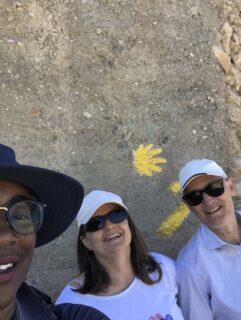
____
… That is all for now, but this story will be continued in the next post, Reading the Signs, Part 2.
____
My new YouTube channel – Noire Pilgrim By Shirley J – will feature short videos, snippets, and shorts from my pilgrimage on the camino. –
Please take some time and enjoy the videos.
And let me know what you think.
Gracias!
Moving fear and doubt from my mind…. on the Way to Santiago de Compostela.
Baadaye and Buen Camino
Shirley J ♥️
____
This and several posts this summer will chronicle my pilgrimage in Spain where I am walking the 1400 kilometer-long camino Mozárabe, now on the Via de la Plata, northward to Santiago de Compostela. Read my announcement here.
•

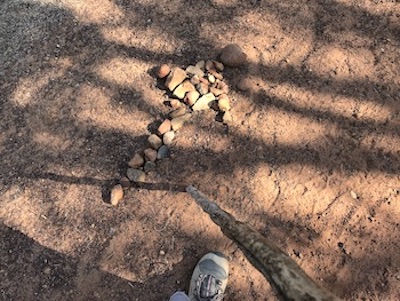
2 thoughts on “👣 Noire Pilgrim: Reading the Signs”
Good deal I am loving this, can’t wait to find your YouTube channel.🙏🏽❤️
Thank you for the ♥️!
Comments are closed.